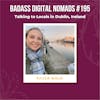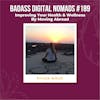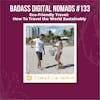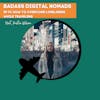What To Do With Your Cell Phone When Traveling Internationally

How can you use your phone in another country? What is the best way to make phone calls when abroad? Kristin answers listener questions about what to do with your cell phone when traveling. Plus, she answers questions about travel insurance and showing proof of return travel when traveling on a one-way ticket.
How can you use your phone in another country? What is the best way to make phone calls when abroad? Kristin answers listener questions about what to do with your cell phone when traveling. Plus, she answers questions about travel insurance and showing proof of return travel when traveling on a one-way ticket.
Questions Answered:
-
If you buy a SIM card in each country you travel to, does it mean that you never have a fixed number, in each destination it changes?
- Do you have one phone for local calling, and another for international calls?
-
How can you use WhatsApp and Facebook Messenger if there's no Wi-Fi nearby?
-
When you buy a ticket to a destination but you don't know how long you have to stay, should you buy a one-way ticket, a round-trip ticket, or a one-way ticket to another destination?
-
Do you have to buy a round trip ticket entering and leaving the same country, or can you buy the entry ticket for one country and the exit ticket for another?
-
What type of travel insurance do you recommend? Is it better to use credit card insurance or buy a separate policy?
- What's your opinion about digital nomad co-living and remote work communities like Remote Year and WiFi Tribe?
Episode 159 Special Offers:
- Apply for Ready to Relocate
- Book a call with Kristin
- Pre-Order Digital Nomads for Dummies
- Ask a Question for the Podcast
Resources Mentioned:
- Best Onward Ticket
- OnwardTickets.com
- Google Fi
- T-Mobile International
- SafetyWing Insurance
- World Nomads Insurance
- WiFi Map App
Related Podcasts:
- What It's Like to Work Online and Travel with Remote Year
- How To Travel the World Full-Time with Remote Year Founder, Greg Caplan
- Founder of Hacker Paradise on The Maverick Show
...........................................................................................
Connect with Kristin:
- Follow on Instagram
- Subscribe to Traveling with Kristin on YouTube
- Subscribe to Digital Nomad TV on YouTube
- Join the Badass Digital Nomads Facebook Group
...........................................................................................
Support the Badass Digital Nomads Podcast:
- Buy Kristin a Coffee
- Become a Patron
- Leave a 5-Star Review
- Buy Official Merch
- www.badassdigitalnomads.com
...........................................................................................
A special thank you to Kristin's Patrons!
Warm welcome to new patrons, Em Winn, Daniel Sullivan, and Dion!
Become a Patron for $5/month at Patreon.com/travelingwithkristin
...........................................................................................
Podcast descriptions may contain affiliate links of products and services we use and recommend at no additional cost to you.
Sneak Peek:
Kristin: 00:00:00 You know, especially if you're solo traveling and you're gonna be in a rural place and you wanna make sure that there's no dead zones where you're going to be traveling through or where you're actually going to be living because your sim card's not gonna do you much good that 4G or 5G speeds if you don't have cell signal.
Introduction: Welcome to Badass Digital Nomads, where we're pushing the boundaries of remote work and travel, all while staying grounded with a little bit of old school philosophy, self-development, and business advice from our guests.
Kristin Wilson, Host: 00:00:41 Hey there, Kristin, from Traveling with Kristin here and welcome to episode 159 of Badass Digital Nomads. You know, I get a lot of questions from you guys each week and so I thought it would be a fun idea to do kind of a listener FAQ calls type of podcast. And I picked a few questions from the feedback form, which I will link to in the show notes. So if you want to ask me a question to answer on the podcast, you can click that form, fill it out in about 30 seconds or so and submit your question for a future episode. And in today's episode, I also wanted to include a few questions from one of my consulting clients, Andrea, because I thought she asked some really great questions. And now Andrea moved temporarily from Columbia to Dubai for a few months and she had some really good questions in her consulting calls with me.
Kristin: 00:01:42 So I wanted to share some of those answers with you today. And if you would like help with an upcoming move or anything related to your digital nomad or location independent lifestyle, you can also book a call by reaching out to hello@travelingwithKristin.com. And I'll also drop my contact link in the show notes. The first question she had was related to buying a one way or a round trip ticket. So she asks, when you buy a ticket to a destination, knowing that you're only going to stay for several weeks, but you don't know exactly how many, do you buy only a one-way ticket or a round trip ticket, or do you buy a one-way ticket to that destination and then buy another ticket to another destination <laugh>. So when you are traveling one way to a country, but you can't travel on a one-way ticket because you don't have a work permit or permanent residency, AKA, you're traveling on a tourist visa, then there is a rule that you need to show proof of onward travel or proof of return travel.
Kristin: 00:03:00 So this question is for anyone who is traveling with just your passport or with a shorts stay visa or with some type of tourist visa where you don't have any official status to work or reside in a country. So you're just going for fun, you're just going for tourism. And this is a great question because this is something that I didn't know about when I started traveling and especially when I became a digital nomad. I would want to, you know, buy a ticket to one place and then I didn't know exactly where I was gonna go after that. And I found out pretty quickly that you do need to show where you're going next. And a strategy that I used to use was to book a fully refundable ticket to the next place that I was going or to back to my home country. So if I booked a one way ticket to Sweden, I would also have a fully refundable one-way ticket coming back to my home country for another date within the time period that was allowed on a tourist visa.
Kristin: 00:04:10 And then after I was in the country and I knew where I was going to go next, if needed, I would cancel that ticket or sometimes I would travel back on that same ticket. Another thing that I used to do would just be to buy a round trip ticket that had a return date at the end of my tourist visa. So if my tourist visa was good for 90 days to a destination, then I would have a return ticket coming back just before the end of that period. And if it's somewhere in Europe and you weren't going to be in that one country for 90 days, you could always travel around different countries and then fly back out from that same airport that you bought the round Tripp ticket through. And another thing that I would do sometimes is just pay the change fee and change my ticket later.
Kristin: 00:05:02 So I would have a ticket within 90 days and then when it got closer to the end of that time, if I wasn't ready to come back yet, I would just change it and pay a $100 or $200 to change my ticket. And actually now with COVID, a lot of airlines are waiving change fees. So that actually could be a pretty affordable option where you don't really have any risk of booking a round trip ticket because you can probably change it later for no cost at all, or maybe the price of a fair difference if the fair is higher. Um, but sometimes you can just get a credit and then apply it to future travel anyway, so that can be a solution for you. But there's now companies like Best Onward Ticket and onwardticket.com that will actually produce a real flight reservation or travel reservation for you.
Kristin: 00:06:01 So I believe it's around $10 and you can book your one way ticket to a country and then pay $10 to one of these companies that can produce proof of onward travel for you so that you have that. And then that reservation will cancel within 48 hours. So I'll link to those companies in the show notes. But that's something that was invented out of necessity because it was never something that existed many years ago. I should probably mention that this is a bit of a unofficial practice that people have. And I don't know how kindly different countries would look upon it if they knew that so many people were traveling with refundable plane tickets or changing their plans once they got to the country. So that remains to be seen. I think if a lot of people are doing it, then maybe there will be some more oversight or some more rules regarding that.
Kristin: 00:07:00 But the main, uh, reason for that is that the countries just want to ensure that you're not moving there one way and staying there. They want you to show proof that you are, um, as, as a tourist that you're just passing through and that you're going back home or that you're going somewhere else after and that you're just visiting for short term or touristic purposes. And your proof of onward travel doesn't necessarily have to be in the form of a plane ticket. It can also be a train ticket or a bus ticket or any other type of transportation that proves that you will be exiting the country's borders and going to another country. And then another related question she had to the roundtrip destinations question was with a passport that allows you to stay in the Schengen zone in Europe for up to 90 days, do you have to buy a roundtrip ticket entering and leaving from the same country or can you buy the ticket for one country and then the exit ticket-- ticket for another country?
Kristin: 00:08:05 So if you're from a country like uh, the US, Canada, Mexico, Columbia, Japan, South Korea, there's a lot of countries that can enter the EU Schengen zone of 26 different member states for up to 90 days without applying for a visa. It's basically visa free travel just with your passport. Um, would you have to have a round trip ticket to a country in the Schengen zone like France, Spain, Portugal, and then back to your home country round trip? Or could you have two one-way tickets to different places? And the answer is that you could have a one way there and then another one way out to another country that was outside of the Schengen zone within those 30 days. And it could also potentially be a cruise ticket, a train ticket, any type of transportation ticket that brings you out of that region. Another question that she had was about buying SIM cards in different countries.
Kristin: 00:09:12 So she asks, if you have to buy a SIM card in each country, does it mean that you never have a fixed number? And that in every country that you go to, your phone number changes? And the answer to that is yes and no. So let's say you're leaving your home country, you're going to be traveling around for an undetermined amount of time to different countries and you wanna know what you wanna do with your SIM card in your home country. This is something that I actually have a whole lesson on in my private group coaching program called Ready to Relocate. I'll also drop a link in the show notes if you're interested in getting more information about that. But just to kind of give you a summary of what you could do in this scenario that in your home country you could get an international plan or you can actually cut off your number if you don't wanna pay for it and you're not using it.
Kristin: 00:10:12 So some people like to use an international plan such as Google Fi, that they can keep their phone number and it can travel with them to different countries. And then with some Android phones, you can have a dual sim phone. So you can actually have two sim cards and one phone and you can keep your regular number, you can have another local international number as well. But if you were to be using a sim card in different countries, that phone number would change in each place that you go to. But most people, most foreigners who are traveling and using international sim cards are using them for internet purposes. So you could make local calls using that sim card, but for most people they're not gonna use those phone numbers for their businesses. If you want to have one stable phone number that travels with you everywhere, you would need to either get an international plan from your home country or an an internet number through Google Voice or Skype or any of the other types of providers that can forward to you in to different numbers around the world or that you can answer online.
Kristin: 00:11:32 So that's a solution as well. I personally travel with two phones. I like to keep a US number and not change that number. And then I also have an unlocked phone that I use for international SIM cards, but that's not typically a number that I give out to people. That's just if I need to make a local phone call within Serbia, I use that sim card because it will be cheaper to call usually than calling from my US number or from a Skype or a Google phone number. And even if you're out walking around using the internet from your local sim card, it won't affect your ability to reply to people on iMessage. For example, if you're using your, your iCloud email or whatever your Apple email is for iMessage, whichever email you have registered, it won't affect if you're answering people through Messenger or one of the other internet messaging apps.
Kristin: 00:12:33 And also with WhatsApp you can choose to use the same phone number without updating your number every time you change countries and you change sim cards. So that's a nice feature and it's probably the same way with Telegram or Signal. I'd have to check on that. And then along the lines of telecommunications, I have received a lot of different questions in the FAQ form about what are the best ways to communicate when abroad, someone asked, they didn't leave their name so I don't know who this was, but they asked if I have one phone for local calling and another for international. And I kind of already answered that, but the answer would be yes. I, I tend to use my local sim card for local calls and my international plan for other types of calls, but really I tend to use, uh, Skype or another type of online service for making international calls if it's cheaper.
Kristin: 00:13:35 So I'll just compare my T-mobile plan. In some cases, like in Canada and Mexico, it might be the same price as making a domestic call in the US but in other countries it might be more expensive than calling online. So I'm always looking for the best way to communicate with people. And sometimes that's through a FaceTime audio call. Sometimes it's through Zoom or Google Hangouts or another type of web app. Uh, sometimes it's through WhatsApp audio, sometimes it's through video calls. And you know, less and less are we making actual landline phone calls. But when I do, I'll either use my international plan or I'll use uh, like Skype or Google Voice and they also ask if I use the same phone for local and international calls. And that would be no unless I'm switching out the SIM cards. And then technically it would be the same phone, but I just use, you know, my US phone or my local phone.
Kristin: 00:14:35 And another thing with local calling. So if you're going to another country where you're buying a local prepaid SIM card, then you're only gonna have so much credit on that SIM card before you need to reload it. So always check with the phone companies to see what types of prepaid plans they have. Usually postpaid monthly plans aren't available unless you're a resident or a citizen. In some countries it could be possible like if you're going for three months, you might be able to get a monthly plan, but it's usually for one year contracts and it's usually for residents. So when you're looking at those prepaid plans, if you're gonna be using your local phone number to make international calls, that could eat up a lot of the credit pretty quickly. So that just means you need to recharge it more often. And sometimes recharging the prepaid sim cards can be a pain <laugh>, it just depends on the country that you're in and how easy it is.
Kristin: 00:15:44 In some, some cases it's just easier to get another sim card than to recharge it. So also keep that in mind as well. And then also look at the time period of how long your credit's good for. Like some of the tourist sims, they might only be good for one week or for 30 days. And so you also wanna look at that as well. But making an international call with a local sim is probably either not possible or it's gonna use up a lot of credit, but I know in some countries I've been to, I've been blocked from making international calls from that phone. So it's usually just better to use an online app. And then they also ask, okay, if WhatsApp and Facebook Messenger are good for international calls, what do you do when there's no wifi nearby? And in that case you could still use those platforms to make calls.
Kristin: 00:16:41 You would just be using your data. So if you are walking around in Prague and you have your local check sim card and there's no wifi to make wifi related calls, then you could just turn your wifi off and use your data to make those calls. But these days there's so many wifi networks that it's a pretty good chance that you could find one nearby. There's a wifi app called WIFI Finder that I'll link to in the show notes where you can look up um, networks. And then there's also a lot of times public networks in parks and places like that. And some cities could have wifi everywhere, you never know. And there's usually also wifi and the tourism board areas or stores. And then of course in cafes if you buy something, you can usually ask if they have wifi too, if you're going really remote.
Kristin: 00:17:43 Also then see if there's a cell phone coverage map for the destination that you're going to. So if you're gonna be in rural areas, if you're gonna be hiking, if you're gonna be in mountains or valleys or pockets where there might not be cell phone signal, sometimes the cell phone providers have a coverage map online where you can actually zoom in and see what the coverage is in that area. So that's pretty important if you know, especially if you're solo traveling and you're gonna be in a rural place and you wanna make sure that there's no dead zones where you're going to be traveling through or where you're actually going to be living because your sim card's not gonna do you much good that 4G or 5G speeds if you don't have cell signal in that area. Andrea also asked about travel insurance and she asked my opinion over if she should use the insurance that comes with her credit card or if it's better to buy a separate policy.
Kristin: 00:18:47 And I do think we're about due for probably a whole episode talking about travel insurance and travel insurance versus health insurance. Um, I wrote a big section on that in my book in Digital Nomads for Dummies because it's something that um, it's very confusing because there's so many different types of insurance out there, especially when it comes to traveling and health insurance. And so it can be confusing to navigate. But the most important thing to know is that you wanna be covered with a, an emergency travel medical insurance policy that covers you for any travel related expenses and also emergency medical expenses. Like if you were to get in a scooter accident or break a bone or need to be life flighted, you know, God forbid anything happen. But um, anything like that, you wanna have an emergency travel medical policy and that would be like a short term coverage that you can get through a company like Safety Wing, which um, I'll link to in the show notes.
Kristin: 00:20:02 Also World Nomads or there's a lot of different providers you could go through your airline cuz you'll probably see that prompt when you book a plane ticket. They ask if you want insurance, but I always decline that because it's always the most expensive option or one of the more expensive options and usually with not the best coverage. So I always decline the kind of impulse buy that pops up when you book your plane ticket and I go and look for a separate policy. I just used Safety Wing to go to Montreal, Canada and it was only for a week and I think my policy was only like $7 or $14 or something like that. I don't quote me on that, I need to check, but it was really, really affordable and the same policy or not the same policy, but to get coverage just through my airline.
Kristin: 00:20:58 I think it was like $28 or it, it was at least twice as much. So, um, always read the policy before you book, but I like to get a specific policy for that. Now, general International Health Insurance, that's a topic for another episode, but credit card insurance, that is something supplemental that I would never use as my main form of travel insurance. So always wanna make sure that you get an emergency travel medical policy depending on how long you're going to be traveling for. You might wanna get an international health insurance policy that covers you for, you know, your dental work or primary care doctor, annual checkup and appointments, surgeries, things like that. So we can talk about that, um, separately. But your credit card insurance, um, that's good to have. It comes with a lot of cards. Sometimes it has rental car insurance that you can use.
Kristin: 00:22:03 Sometimes it will cover you for some lost baggage, especially if you have a specific travel card or if you have a platinum card or a black card. They usually have some insurance benefits. But, um, I, I see that as just a, a bonus if for some reason I had to make a claim for something that wasn't covered under my regular travel insurance policy, but there's usually a lot of fine print or exclusions or limits to the coverage, I wouldn't feel comfortable using a credit card as my only insurance coverage. She also asked what was my opinion on co-living communities and remote work retreat groups like WIFI Tribe and Remote Year. And if you've been following me for a while, you know that I'm a fan of co-working and co-living, but it really depends on what your goals are in the moment. So for some people they like to live in a co-living environment year round, other people never like to do it and other people like to do it.
Kristin: 00:23:11 Sometimes I fall into the sometimes camp because in my experience now I haven't been on Remote Year or WIFI Tribe even though we've had the founders of Remote Year on this podcast and I'm friends with Julia, one of the co-founders of WIFI Tribe. And I really think highly of all of these groups. Um, Hacker Paradise as well. I listen to a podcast with the founder of Hacker Paradise, who's Spencer Jenz on Matt Bowles podcast, the Maverick Show. And I think it's really cool what what they're doing. And I actually had the same idea back in like 2013, 2015 to have some sort of a group travel program and I'll probably do retreats as well. So I like the concept of it, but for me, going to these sorts of co-living retreats or let's say Nomad Cruise, uh, Nomad Base, anything where you're going to a destination like a foreign country where you don't know anybody, or even if you do, you just want to be around other people, it's great for socializing and it's great to go somewhere and instantly have a comfort zone and a community of other people just so that you don't feel alone.
Kristin: 00:24:31 And I also see it in a way, it's almost like a conference or a mini mastermind in a way, but much more intimate because if you travel to a conference for work, you probably only meet people for maybe a few minutes, a few hours. You might be there for one day or two days, maybe three days if it's a really long conference. So you get a different sort of like surface level interaction with people compared to when you go enjoying one of the co-living communities or one of the work and travel retreat groups. So when I'm going to those groups, I like to really be focused on meeting people and getting to know them really well and spending more of my energy and socializing and networking and strategizing with people, sharing ideas, learning from them. It's kind of a, a way to go and make friends and absorb a lot of information and get really inspired.
Kristin: 00:25:39 Um, but for me, I can't do that every month of every year because I feel like I need time to then build on those relationships, integrate and apply what I've learned, um, maybe go back to like tinkering with something in my business or executing on an idea. And so I like to kind of have that ebb and flow of being around a lot of people and having fun and getting inspired and then also being able to apply that knowledge and do deep work. And then there's also usually people that you hit it off with more than others and maybe you end up splintering off from a bigger group into smaller groups or maybe you travel with one other person. So that's really what I like about those types of groups. And I do like that you can go and join for a couple weeks a month.
Kristin: 00:26:38 I think probably the shortest ones I've seen are one week. And so if if you're in between projects or in between destinations or you have like some downtime from work, it's great to go jet off for a week or so or even a month and, and go live and travel with one of those groups. Of course you can work there at the same time. They are are highly focused on making sure that you have comfortable accommodation and that you have wifi and co-working space and then also usually some fun excursions and other kinds of extras and bonuses and things like that. So I do think that there's definitely a lot of value in those kinds of communities. It's really good for if you have a home base and you just wanna go on some short term locations, so to speak. Um, but there's also people that live that way year round and they'll travel, you know, maybe one month or so to a different destination throughout the year, either with one group, if it's one of the longer programs on remote year or sometimes the groups are changing every four to six weeks or four to eight weeks.
Kristin: 00:27:47 And, and then usually these types of groups have an alumni association so that you can connect with people long term. As with anything, there's pros and cons to every decision, just like there's pros and cons to a destination that you would choose. There's pros and cons to solo travel versus group travel. And some of the, I guess, downsides or factors to take into consideration with any form of group travel or co-living is in some cases it can make the price more affordable, but in other cases it's definitely more expensive compared to living in that country long term. So I've seen work travel groups that can be as much as $2,500 or $3,000 for a week or 10 days in a country where the cost of living per month if you were to live there long term might be only a thousand dollars or 1500 or even $2,000.
Kristin: 00:28:51 So you might spend the same amount of money for one week as you would in one month in that place. Now of course it depends on where you're going, but that's something to keep in mind. But then you're also getting some extra amenities and services and contacts with that. So that's the reason for the, the higher cost. And another thing is just privacy. Like some people like living on their own and they wouldn't want to live in a shared house or building with other people. And so it could depend on how introverted you're feeling at the moment or how extroverted. I also talked to a client who went to one, I can't remember exactly which company it was or which destination it was, but she booked a month there and then she got there and she really didn't like it, but she felt like she had to stay because she had paid for it in advance.
Kristin: 00:29:48 And so she just stuck it out for the whole month even though she didn't like it. So that's also a risk as well. Whereas if you're traveling by yourself, you have more flexibility to like, if you don't like a place, you can just move on. But meeting people is always a really big concern when you're traveling to a foreign country. So this is one of the fastest ways to meet people, although the people that you meet may or may not be from that country, they might be from a lot of different countries, but if you're looking for kind of the more adventurous way of exploring the lay of the land on your own than, you know, traveling on your own or solo traveling might be the best route for you. But I like to do maybe a month or so of co-living per year, at least that's what I was doing before the pandemic, like 2018, 2019.
Kristin: 00:30:38 I was doing a couple months per year of traveling with other people or co-living even before that with non-digital nomads, with just my friends. And then I would balance that out with, with a few months of just solo travel and still meeting with people in the places that I went, but just not living with them. So we have a lot more questions here. There's questions about what to do with money, how to send money internationally, the best way to send wire transfers, how, when and where to exchange money, when to use the local currency. Um, so let's do another episode talking about more of the kind of financial side of travel and some of the FAQs there, travel credit cards, things like that. And call it a day for today. So I hope you're having a beautiful morning, afternoon, or evening wherever you are in the world. And if you have a question for an upcoming listener questions FAQ episode, then fill out the feedback survey in the show notes. And if you'd like some more private one-on-one attention, send an email to my team and I at hello@travelingwithkristin.com and see you again next week.
Kristin: 00:31:57 My first book, Digital Nomads for Dummies, is available for pre-order now wherever books are sold. You can find it by searching on your favorite retailers like Amazon or Barnes and Noble by using the link in the show notes or by going to Travelingwithkristin.com/for-dummies. That's F O R dash D U M M I E S.































































